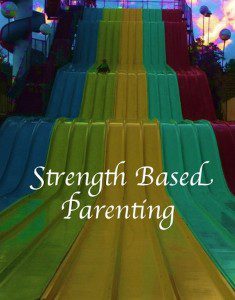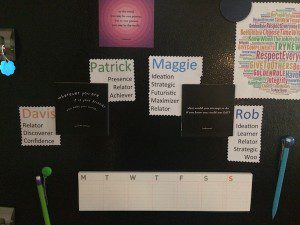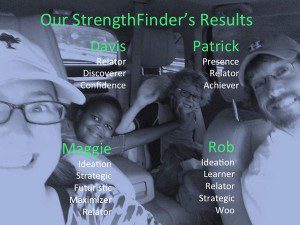 So this parenting thing is hard. My boys are in 5th grade and the parenting challenges seem to increase every year. It isn’t that the boys are physically demanding, like they were through their infancy and toddler years – we’re fortunate that they are both quite self-sufficient. It’s just that every year, the stakes get higher and the mental stuff gets more complex. And we haven’t even hit the teen years yet!
So this parenting thing is hard. My boys are in 5th grade and the parenting challenges seem to increase every year. It isn’t that the boys are physically demanding, like they were through their infancy and toddler years – we’re fortunate that they are both quite self-sufficient. It’s just that every year, the stakes get higher and the mental stuff gets more complex. And we haven’t even hit the teen years yet!
Like all of you, I’m intensely motivated to raise good, happy, healthy, kids. Whatever moniker you put on it, our goals are basically the same – we want our kids to be able to handle their own life and not be limited in their adulthood by mistakes we’ve made as their parents.
However you phrase the goal – it’s a big task.
Thankfully, I don’t naturally harbor guilt, because guilt only makes the task harder and the self-doubt more powerful. If guilt eats at you, check out my post – Guilt Free Parenting and Amy’s post – My Constant Struggle with Mom Guilt. Not feeling guilty, doesn’t mean I’m not reflective – there are lots of ways I can do better.
Patrick is going through something right now – a growth-spurt, a low-grade fever, or an adjustment to a new school (or maybe all three). Because – WOW. His normal sweet, caring, thoughtful, motivated self has been temporarily replaced by a smart-mouthed, passive-aggressive, back-talker. This has happened before and thankfully the phase is always short-lived. During these times I notice that I’m catching his mistakes a lot more often than I’m catching his triumphs. It isn’t a pattern that I find particular useful for my kids’ development – and that is all on me.
I’ve found my kids do most of their growing through positive reinforcement.
Many years ago, the awesome folks at Rackspace (where Rob works) began a new approach to talent development. StrengthsFinders is a program run by Gallup that helps companies focus on their employee’s strengths – not on their deficits. Rob and I really embraced this concept, not just at work, but also at home – focus on strengths, foster the good.
Don’t worry – this isn’t a touchy-feely, no-consequences, only focus on the positives kind of thing. Rather, it is an intentional development of our kids’ strengths.
When our boys were little, we bought How Full is Your Bucket – For Kids, by Tom Rath and Mary Reckmeyer, PhD. In the book, you follow the story of Felix as he learns that it feels great to have a full bucket (positive reinforcement) and he explores ways to fill other’s buckets. It’s a simple picture book that helps kids examine how they support and encourage others and just how much impact they can have on someone else.
Now that our kids are older, they have taken Gallup’s StrengthsExplorers assessment (recommended for kids ages 10 – 14). The assessment took about 10 minutes each, cost $10/kid and gave us a list of each kid’s three main strengths. There were no groundbreaking revelations in the results – after-all, like most parents, we know our kids pretty well. Instead, the cool thing about taking the assessment is that now our kids have a way to name these vague pieces of their identity – a way to focus on their strengths.
Here’s a quick overview of the strengths that Gallup defines: For Adults and For Kids
I promise this isn’t as esoteric as it sounds. Here are some of the practical ways we use a strength-based approach in our parenting.
- Promote a positive self-concept. Our strengths have a prominent spot on our fridge as a quick reminder that we are each uniquely gifted and that we each bring a valuable perspective to every situation.

- Set them up for success. Davis has strengths in building long-lasting, deep friendships and exploring new things. He’s the perfect kid to send to a sleep-away camp where the same kids come back year after year. When he mentioned wanting to switch terms, we knew it was his “Discoverer” tendencies coming out and we had to help him weigh those against his “Relator” tendencies.
- Catch them doing a good job. The Magic Ratio of Praise to Criticism (here and here and here) is somewhere around 5:1; it’s probably higher for Davis because of his anxiety disorder. Framing positive reinforcement around his strengths, gives him confidence that we know him inside and out.
- Focus on their innate goodness. We work from an assumption that our children are well intentioned. It helps us recognize that their mistakes are growth opportunities and a normal part of growing up – not malicious attempts to deceive or disobey.
- Develop a sense of family pride. It seems that having a shared focus on our strengths help build a sense of belonging – something I’m keen to cement before we get to the teen years. Interestingly, all four of us are “Relators” – meaning we find deep satisfaction in building relationships.
- Promote a positive inner-monologue. If I don’t show the boys that I see the best in them, how will they learn to see the best in themselves? Giving them consistent and positive language to describe themselves should provide them tools to combat the nagging self-doubt that destroys self-esteem.
- Give them a chance to shine. Sometimes Patrick’s “Presence” strength can be overwhelming as he vies to be the center of attention or Davis “Confidence” strength has him boasting or taunting during a neighborhood basketball game. These are good reminders that we can do a better job channeling their strengths – like public speaking and drama opportunities for Patrick and joining social justice activities for Davis.
Like I said earlier, this parenting thing is hard. We want our kids do to their best, to be their best selves. So take a minute to think about your kid’s natural strengths – focus on their personalities, not their accomplishments. Help them understand how they shine, what makes them tick, how they are unique. That way, they’ll also understand that messing up is part of growing up, but that their mistakes and missteps don’t define them.













I’ve been at this parenting thing for nearly 30 years, yet I still have a 15 year old at home. One would think I’ve got parenting down pat, but you have just taught me something new and wonderful! My 15 year old is highly gifted and we are still dealing with emotional and social issues related to giftedness. As a teacher and a parent, I’ve always known about focusing on strengths, but Strenghtsfinders may be just what my 15 year old needs to have a non-parent, objective view of his strengths to help him have confidence in his future. Thanks for this post–I feel like I just received an early Christmas present!
Oh Celi! What a sweet and wonderful compliment. Thank you!
We have a profoundly gifted kid at home also. I really like how the StrengthFinders material has helped him identify and have pride in parts of himself beyond his intellect. I don’t want him all wrapped up in being smart – his identity is so much more than that! This has given him a way to understand and talk about his strengths in broader terms.
I hope it is helpful for your family! Make sure you download their parent and child guides to understanding the test results. It will guide you through practical ways to focus on your son’s strengths.
This one of the best parenting articles I’ve ever read, period. This advice absolutely translates to educators, as well. Thank you!
Thanks, Jade! You are very kind.